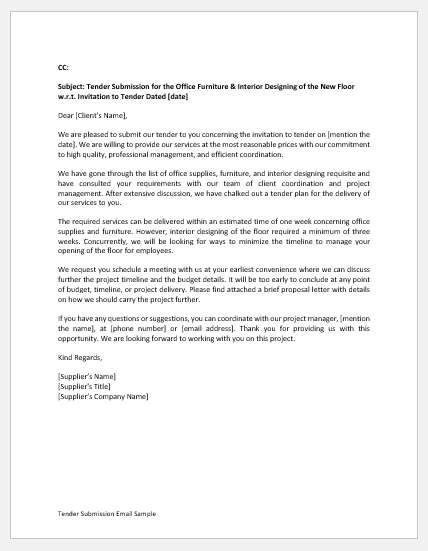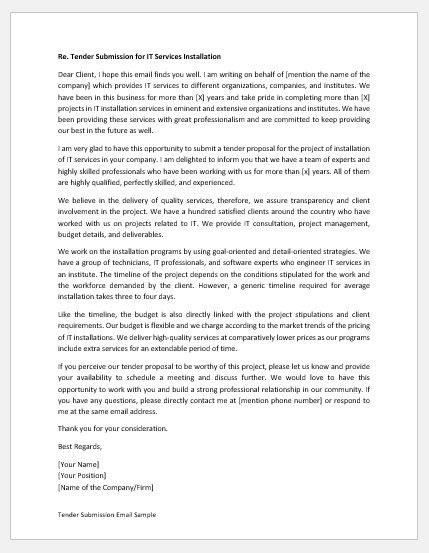Individuals and companies that look for professional services invite people to present the services they are ready to provide. In other words, people are invited to submit the tender. When people are ready to present their service in order to be accepted by the reader, they usually submit a tender document. In some cases, they are also given the freedom to submit the tender via email.
What is a tender submission email?
It is an official email that is generally used for communicating the proposal from a service provider. In this email, the service provider gives a brief introduction about his business and the services he provides. The user contacts him via email and asks him to submit a complete document if he likes the offer. Therefore, engagingly drafting the email is an important step to be taken into consideration.
Why is it important to write an email for tender submission?
A proposal or a tender brings a great opportunity for people who want to win over their clients and capture their attention so that they can choose them over their competitors in the industry. Therefore, people who write an email generally have an edge over their competitors who either don’t write the email or forget to highlight the key aspects of the work they do.
What are the main characteristics of the tender submission email?
Your email is a professional correspondence between you and your prospective customer and you should make sure that it possesses the following characteristics:
The email should be persuasive:
Just like a conventional proposal, the tender submission email should be persuasive. Now, it is a subjective term and it depends on you how you make it convincing. The first thing you need to do is to convince the reader into opening the email that reaches his inbox. For this, you need to work on the subject. The subject of the email should be engaging and compelling so that the reader opens it with willingness.
It should be supported by evidence:
When you are writing this email to promote your services, you will be required to give information about the work you did in the past, the experience you got, and the satisfied customers you have under your belt. However, you cannot flaunt the work you do in the professional world because people will ask you to provide evidence.
So, always back your email with the evidence that you can attach to it. People who are genuinely interested in your proposal will look for the evidence before they decide to strike a deal with you. So, everything starts here with the evidence you attach to the email.
It should give reasons to the buyer for choosing you:
If the buyer has requested a tender submission via email, he might have received numerous emails. Here, if you don’t provide reasons to the buyer to choose you, your email will be lost somewhere in his inbox and he would like to consider those who have put effort and efforts can be seen in how you outline everything in the email.
So, you need to work on your specialty and also on those factors that make you different and better at the same time from your competitors. This will let you prove that you can bring a difference to the industry because you stand out.
It is short:
An email is usually a very short type of correspondence between you and your prospective client. You don’t need to write a long email just because you want to convince the reader into accepting your offer. Just stay focused on what you offer, and the requirements of the recipient, and then close the email after providing your contact details.
It should contain attachments:
Since you are submitting the bid via email, the document that you want to provide email must be provided to the reader through the email attachments.
The attachments should include proof of your previous work, screenshots of your customers with positive reviews, some legal documents to provide your authenticity, samples of work, and much more. Make sure that you mention what you are attaching with the email so that there remains no confusion.
Sample Emails & Formats

Email Sample File 98 Kb

Email Sample File 98 Kb
- Ramadan Schedule Notification for Staff
- One Day Absent Note to Boss
- Request Letter to Staff for Voluntary Deduction from Salary
- Holiday Closing Messages
- Letter Requesting Transfer to another Department
- Letter Requesting Promotion Consideration
- Umrah Leave Request Letter to Boss
- Ramadan Office Schedule Announcement Letters/Emails
- Letter to Friend Expressing Support
- Letter to Employer Requesting Mental Health Accommodation
- Letter Requesting Reference Check Information
- Letter Requesting Salary Certificate